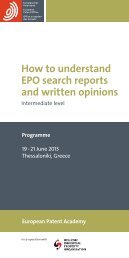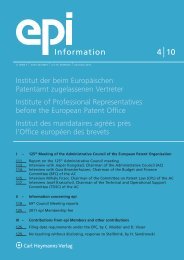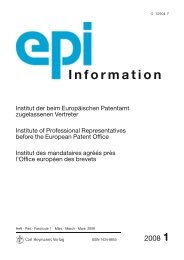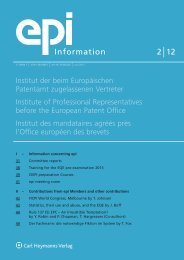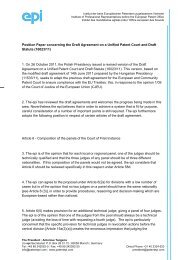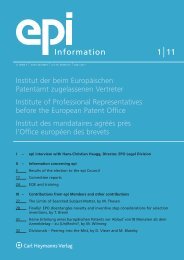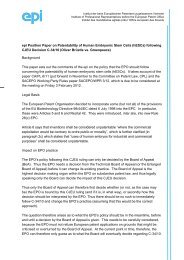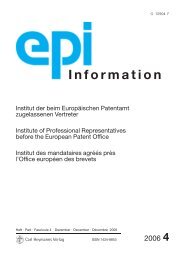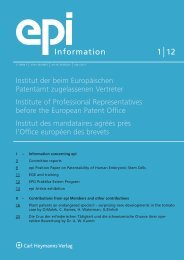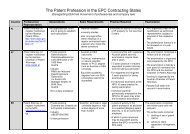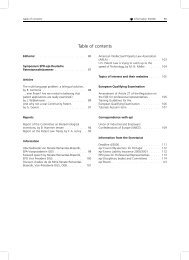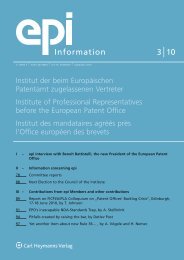epi Information 2/2009
epi Information 2/2009
epi Information 2/2009
Create successful ePaper yourself
Turn your PDF publications into a flip-book with our unique Google optimized e-Paper software.
<strong>Information</strong> 2/<strong>2009</strong> Committee Reports 45<br />
Report of the EPO Finances Committee<br />
J. Boff (GB)<br />
Chairman<br />
A fee strategy debate started at the March Administrative<br />
Council (AC) and will require a lot of attention this<br />
year. The Office will be consulting widely on sustainable<br />
financing of the European patent system.<br />
EPO Paper CA/72/09 and its many annexes present<br />
some overall discussion on fee policy, and CA/59/09,<br />
CA/62/09 and CA/51/09 make some contribution.<br />
I quote from CA/64/09 which summarises the results<br />
of the AC discussions and comment below: –<br />
34. After a lengthy debate during which the delegations<br />
stressed the quality of the Office’s preparatory work,<br />
the chairman, noting that areas of broad consensus<br />
had emerged, summed up as follows:<br />
35. I. Perspective<br />
The delegations agreed on the need to take account<br />
of the economic and financial context in Europe and<br />
worldwide. That meant not adding to the financial<br />
burden on industry, and that the Office had to<br />
master its costs in order to assure its future.<br />
COMMENT – Good news.<br />
II. Tackling costs the priority<br />
The Office’s priority had to be to increase output and<br />
productivity, setting itself annual target figures. Salary<br />
trends had to be correlated with productivity,<br />
and discussions initiated on reforming the „social<br />
package“ (pension and social-security schemes).<br />
COMMENT – Good news.<br />
III. IFRS<br />
The delegations took the view that whilst the use of<br />
IFRS as the „generally accepted accounting principles“<br />
under Article 42(1) EPC could not be called<br />
into question, thought should be given to how they<br />
were applied and what conclusions were drawn. The<br />
main aim was to maintain and strengthen the<br />
Office’s operational capacity. That meant, in particular,<br />
an active HR management policy and investment<br />
in electronic tools. Lastly, the delegations felt<br />
that negative equity of about 80% could be considered<br />
acceptable.<br />
COMMENT – <strong>epi</strong> have been saying to the EPO for some<br />
time that IFRS does not make decisions, it presents data<br />
from which decisions can be made.<br />
IV. Fees<br />
The delegations were against any overall increase in<br />
fees, but prepared to re-examine their structure. Any<br />
fee increase had to be preceded by lower costs and<br />
higher productivity, and the balance kept between<br />
procedural and renewal fees.<br />
COMMENT – Good news on the overall increase in fees.<br />
However the balance issue needs to be investigated. It is<br />
not clear whether „renewal fees“ means renewal fees<br />
on granted patents or includes renewal fees on pending<br />
applications.<br />
V. Structures and behaviour<br />
The delegations recommended studying, as part of<br />
the general objective of „raising the bar“, any<br />
measure likely to facilitate the Office’s work by<br />
easing, streamlining and simplifying procedures<br />
and processes. Also, fee adjustments could be used<br />
to counter procedural abuse by users.<br />
COMMENT – This is good news if the fee adjustments are<br />
chosen with appropriate regard to applicant behaviour,<br />
but this has not happened before. The claims fees fiasco<br />
occurred despite the user community making it clear that<br />
the increase in claims fees would result in extreme<br />
responses from applicants. It also appears that no<br />
account has been taken in CA/35/09 (Basic Assumptions<br />
for the Business Plan and Budget 2010) of the increase in<br />
filings in 2010 that will be a consequence of the transitional<br />
provisions in CA/D2/09 introducing deadlines for<br />
filing divisional applications. This makes budget forecasts<br />
unreliable.<br />
<strong>epi</strong> continues to press for greater involvement in the<br />
decision making process.<br />
VI. Harmonisation of renewal fees<br />
One idea here was to re-examine the minimum<br />
amounts, with a view to bringing their levels closer<br />
to the thresholds required. The ongoing Community<br />
patent discussions could have a positive effect.<br />
Amending the distribution key was out of the question.<br />
COMMENT – This is very tricky. Harmonising fees may<br />
affect Member States ability to support innovation in<br />
their territory, and may have a negative effect in view of<br />
the widely different populations of the Member States.<br />
For example, if the same harmonised fee applied to<br />
Luxembourg and Germany the cost per customer paid by<br />
users would vary enormously leading to even greater<br />
differences in validation rates. Similarly the Community<br />
patent discussions could have some nasty effects on<br />
national patent offices.<br />
36. In the light of that, the Council asked the Office<br />
to make, as soon as possible, specific proposals for<br />
the different areas identified and in line with the<br />
approach outlined.<br />
37. These proposals would be examined in accordance<br />
with standard Council procedure, i. e. passing<br />
via the appropriate committee (Budget and Finance;<br />
Patent Law; Technical and Operational Support) for<br />
the topics in question.<br />
38. In line with its brief, the Council’s Board would<br />
monitor the Office’s elaboration of proposals meet-



